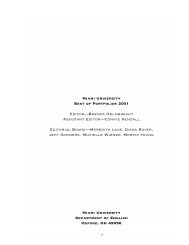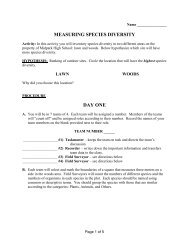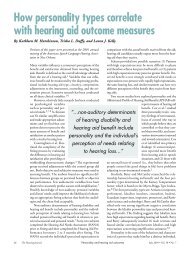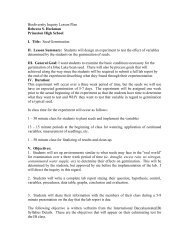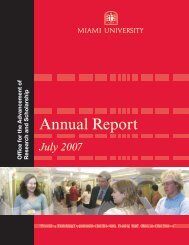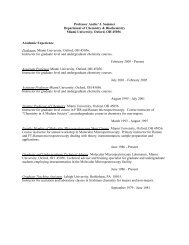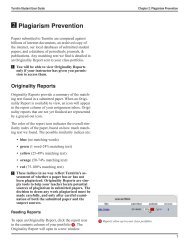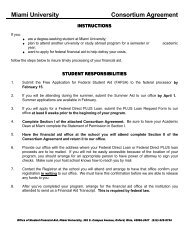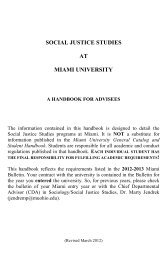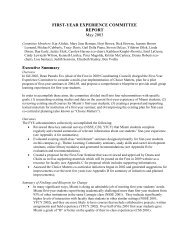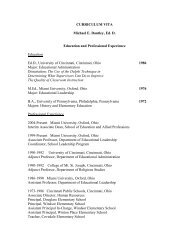Interdisciplinary Research Manual - Units.muohio.edu
Interdisciplinary Research Manual - Units.muohio.edu
Interdisciplinary Research Manual - Units.muohio.edu
Create successful ePaper yourself
Turn your PDF publications into a flip-book with our unique Google optimized e-Paper software.
43<br />
Thesis and Argument Presentations<br />
Your thesis is your “take” on the overall problem or issue or question of the<br />
project. You probably started last semester with a topic area that you hopefully narrowed<br />
down to a problem, issue, or question that is now the focus of your project. You can have<br />
a thesis on a topic only if you problematize it—if you address an issue (i.e., a question<br />
with more than side) related to that topic. Lay out in your presentation not so much the<br />
topics you will cover but the line of argument that links them together. Reveal not what<br />
the argument flows through, but the argument itself. Point B follows Point A because…<br />
If you have trouble identifying your line of argument and you have an outline, especially<br />
if it’s a fairly detailed outline, ask yourself what the rationale is for that sequence of<br />
topics. What was the line of reasoning that led you to put them in those categories and<br />
place the categories in that sequence and not some other sequence?<br />
State your thesis in every day language, removing all jargon. Otherwise, your<br />
understanding of the issue or problem will be unduly influenced by the discipline through<br />
which the jargon was developed. As you write individual chapters, feel free to show how<br />
that discipline or interdiscipline restates the issue or problem in more technical terms. But<br />
when you do so, you should be clear about how the generic problem or issue has been<br />
narrowed or focused in the process. If you cannot state it in jargon-free language or if you<br />
are doing no more than translating jargon into everyday language, then you should ask<br />
yourself if you really have an interdisciplinary project (or if your project is dominated by<br />
the discipline in which the jargon was developed).<br />
Keep in mind that you should treat your thesis as a hypothesis and its supporting<br />
argument as preliminary. As you research for each chapter, it is terribly important to be<br />
open to information that challenges them. You need some sort of thesis to guide your<br />
research and you need a line of argument to determine what to include and what to<br />
exclude. But your emotional investment needs to be in understanding the problem in its<br />
full complexity, not in a particular solution to it—in understanding the issue not in a<br />
particular position on that issue. If your hypothesis is fully supported by the data, then<br />
you can feel vindicated, and it will be relatively easy to revise the complete rough draft<br />
because you won’t need to reconceptualize the project. But if you find evidence that<br />
challenges your hypothesis, you should feel excited: you are on your way to a novel way<br />
of thinking about the problem and the prospect of a genuine contribution to the literature.<br />
As you attempt to construct an interdisciplinary argument about the phenomenon<br />
that is the focus of your project, you are likely to encounter a variety of disciplinary<br />
explanations of it. For a project examining the up-turn in the diagnosis of attention<br />
deficit/hyperactive disorder, you will find at least half a dozen candidates for the<br />
precipitating factor: drug companies wishing to sell a new drug, psychiatrists wishing to<br />
supplant clinical psychologists, <strong>edu</strong>cators seeking ways to control disruptive classroom<br />
behavior so they can respond to r<strong>edu</strong>ced funding by ‘doing more with less’, a change in<br />
the cultural construction of childhood, a change in the demands placed on children in an<br />
increasingly competitive society, or parents who feel they both need to work to meet their<br />
target lifestyle and thus who have less time to devote to children with problematic<br />
behavior. Your challenge as an interdisciplinarian is not to select one and reject the rest,<br />
but to array them in a way that makes sense. Do some logically precede others, so that<br />
one is an initiating cause while others are intervening or intermediary causes; i.e., is there<br />
a logical chain of causation? Do they operate on different levels, such that the same cause




